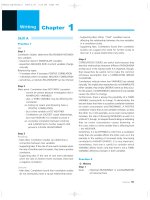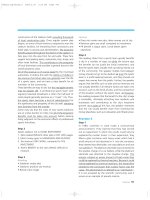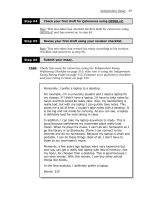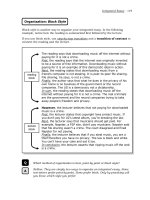Tài liệu Vocabulary for the toefl ibt part 14 pdf
Bạn đang xem bản rút gọn của tài liệu. Xem và tải ngay bản đầy đủ của tài liệu tại đây (123.67 KB, 10 trang )
WORD LIST
123
approbation (ap·ro˘·'bay·sho˘n) n. approval. The local authorities issued an approba-
tion to close the street for a festival on St. Patrick’s Day.
appropriate (a˘·'pro¯·pre¯·˘t) adj. suitable for a particular person, condition, occasion,
or place; fitting. (
a˘·'proh·pree·ayt) v. to take for one’s own use, often without per-
mission; to set aside for a special purpose. The state legislature will appropriate two
million dollars from the annual budget to build a new bridge on the interstate highway.
apropos (ap·ro˘·'poh) adj. appropriate to the situation; suitable to what is being
said or done. adv. 1. by the way, incidentally. 2. at an appropriate or opportune
time. Chancey’s comments may have been disturbing, but they were definitely apropos.
arcane (ahr·'kayn) adj. mysterious, secret, beyond comprehension. A number of
college students in the 1980s became involved in the arcane game known as “Dun-
geons and Dragons.”
archaic (ahr·'kay·ik) adj. belonging to former or ancient times; characteristic of
the past. The archaic language of Chaucer’s tales makes them difficult for many stu-
dents to understand.
archetype ('ahr·ki·t¯p) n. an original model from which others are copied; origi-
nal pattern or prototype. Elvis Presley served as the archetype for rock and roll per-
formers in the 1950s.
ardor ('ahr·do˘r) n. fiery intensity of feeling; passionate enthusiasm, zeal. The
ardor Larry brought to the campaign made him a natural spokesperson.
arduous ('ahr·joo·u˘s) adj. 1. very difficult, laborious; requiring great effort.
2. difficult to traverse or surmount. Commander Shackleton’s arduous journey
through the Arctic has become the subject of many books and movies.
ascent (a˘·'sent) n. 1. an upward slope. 2. a movement upward, advancement. The
rock climbers made the ascent up the side of the mountain.
ascetic (a˘·'set·ik) adj. practicing self-denial, not allowing oneself pleasures or
luxuries; austere. Some religions require their leaders to lead an ascetic lifestyle as an
example to their followers.
askew (a˘·'skyoo) adj. & adv. crooked, not straight or level; to one side. Even the
pictures on the wall stood askew after my five-year-old son’s birthday party.
asperity (a˘·'sper·i·tee) n. harshness, severity; roughness of manner, ill temper,
irritability. The asperity that Marvin, the grumpy accountant, brought to the meet-
ings usually resulted in an early adjournment.
6044_Vocabulary_ToefliBT(4).qxd 9/19/07 11:44 AM Page 123
VOCABULARY FOR TOEFL iBT
124
assay (a˘·'say) v. 1. to try, put to a test. 2. to examine. 3. to judge critically, evalu-
ate after an analysis. The chief engineer wanted a laboratory to assay the steel before
using it in the construction project.
assent (a˘·'sent) n. agreement; concurrence; consent. v. to agree to something
especially after thoughtful consideration. In order to pass the new law, the com-
mittee must reach an assent.
assiduous (a˘·'sij·oo·u˘s) adj. diligent, hardworking; persevering, unremitting.
Omar’s teachers applaud his assiduous study habits.
assuage (a˘·'swayj) v. to make something less severe, to soothe; to satisfy (as
hunger or thirst). The small cups of water offered to the marathon runners helped to
assuage their thirst.
attenuate (a˘·'ten·yoo·ayt) v. 1. to make thin or slender. 2. to weaken, reduce in
force, value, or degree. The Russian army was able to attenuate the strength and
number of the German forces by leading them inland during winter.
audacious (aw·'day·sh u˘s) adj. fearlessly or recklessly daring or bold; unre-
strained by convention or propriety. Detective Malloy’s methods were considered
bold and audacious by his superiors, but they often achieved results.
augment (aw·'ment) v. to increase in size, strength, or intensity; enlarge. Arty
tried to help Ann and Stan settle their differences, but his interference only augmented
the problem.
august (aw·'ust) adj. majestic, venerable; inspiring admiration or reverence.
Jackie Kennedy’s august dignity in the days following her husband’s assassination set a
tone for the rest of the nation as it mourned.
auspice ('aw·spis) n. 1. protection or support, patronage. 2. a forecast or omen.
The children’s art museum was able to continue operating through the auspices of an
anonymous wealthy benefactor.
austere (aw·'steer) adj. 1. severe or stern in attitude or appearance. 2. simple,
unadorned, very plain. I know my dad seems austere, but he’s really just a great big
teddy bear.
authoritarian (a˘·thor·i·'tair·i·a˘n) adj. favoring complete, unquestioning obedi-
ence to authority as opposed to individual freedom. The military maintains an
authoritarian environment for its officers and enlisted men alike.
automaton (aw·'tom·a˘·to˘n) n. someone who acts or responds in a mechanical or
robotic way. 2. a self-operating or automatic machine, a robot. Because she fol-
6044_Vocabulary_ToefliBT(4).qxd 9/19/07 11:44 AM Page 124
WORD LIST
125
lowed the same routine every morning, Natasha made coffee, cooked breakfast, and
made her children’s lunch like an automaton.
autonomy (aw·'ton·o˘·mee) n. personal or political independence; self-
government, self-determination. The teenager desired fewer rules from her parents
and a sense of autonomy.
avant-garde (a·vahnt·'ahrd) adj. using or favoring an ultramodern or experi-
mental style; innovative, cutting-edge, especially in the arts or literature. Yvette
prefers the avant-garde style of writers like Donald Barthelme to the traditional nar-
rative technique.
aversion (a˘·'vur·zho˘n) n. 1. a strong, intense dislike; repugnance. 2. the object of
this feeling. Todd has an aversion to arugula and picks it out of his salads.
B
baleful ('bayl·fu˘l) adj. harmful, menacing, destructive, sinister. Whether it’s a
man, woman, car, or animal, you can be certain to find at least one baleful character
in a Stephen King horror novel.
balk (bawk) v. 1. to stop abruptly and refuse to go on. 2. to obstinately refuse or
oppose. Old man Jones was finally ready to capitulate and sell his land to the timber
company, but he balked when he saw that he would be compensated for only half of the
value of his property.
banal (ba˘·'nal) adj. commonplace, trite; obvious and uninteresting. I was expecting
something original and exciting, but the film turned out to have a banal storyline and
mediocre acting.
bane (bayn) n. 1. cause of trouble, misery, distress, or harm. 2. poison. The bane
of the oak tree is the Asian beetle.
beguile (bi·'¯l) v. to deceive or cheat through cunning; to distract the attention
of, divert; to pass time in a pleasant manner, to amuse or charm. Violet was able
to beguile the spy, causing him to miss his secret meeting.
belie (bi·'l¯) v. 1. to give a false impression, misrepresent. 2. to show to be false,
to contradict. By wearing an expensive suit and watch, Alan hoped to belie his lack of
success to everyone at the reunion.
bellicose ('bel·˘·kohs) adj. belligerent, quarrelsome, eager to make war. There
was little hope for peace following the election of a candidate known for his bellicose
nature.
6044_Vocabulary_ToefliBT(4).qxd 9/19/07 11:44 AM Page 125
VOCABULARY FOR TOEFL iBT
126
belligerent (bi·'lij·e˘r·e˘nt) adj. hostile and aggressive, showing an eagerness to
fight. Because Omar had a reputation for being belligerent, many people refused to
associate with him because they feared confrontation.
benevolence (be˘·'nev·o˘·le˘ns) n. the inclination to be kind and generous; a dis-
position to act charitably. Regina showed benevolence when she volunteered to help
raise money for the local soup kitchen.
benign (bi·'n¯n) adj. 1. gentle, mild, kind; having a beneficial or favorable nature
or influence. 2. not harmful or malignant. Simo’s actions toward his competitors
was never mean-spirited; he always acted in a benign manner.
bevy ('bev·ee) n. 1. a large group or assemblage. 2. a flock of animals or birds.
There was a bevy of eager bingo fans waiting outside the hall for the game to begin.
bilk (bilk) v. to deceive or defraud; to swindle, cheat, especially to evade paying
one’s debts. The stockbroker was led away in handcuffs, accused of trying to bilk sen-
ior citizens out of their investment dollars.
blasé (blah·'zay) adj. 1. uninterested because of frequent exposure or indulgence.
2. nonchalant, unconcerned. 3. very sophisticated. Quincy has traveled so much
that he speaks of exotic places such as Borneo in a totally blasé manner.
blasphemy ('blas·fe˘·mee) n. contemptuous or irreverent acts, utterances, atti-
tudes or writings against God or other things considered sacred; disrespect of
something sacrosanct. If you committed blasphemy during the Inquisition, you
would be tortured and killed.
blatant ('blay·tant) adj. completely obvious, not attempting to conceal in any
way. Samuel’s blatant disregard of the rules earned him a two-week suspension.
blight (bl¯t) n. 1. a plant disease that causes the affected parts to wilt and die.
2. something that causes this condition, such as air pollution. 3. something
that impairs or destroys. 4. an unsightly object or area. They still do not know
what caused the blight that destroyed half of the trees in the orchard.
blithe (bl¯th) adj. light-hearted, casual, and carefree. Rachel’s blithe attitude toward
spending money left her broke and in debt.
boisterous ('boi·ste˘·ru˘s) adj. 1. loud, noisy, and lacking restraint or discipline.
2. stormy and rough. The boisterous crowd began throwing cups onto the field dur-
ing the football game.
bolster ('bohl·ste˘r) v. 1. to support or prop up. 2. to buoy or hearten. Coach
Edmond’s speech bolstered the team’s confidence.
6044_Vocabulary_ToefliBT(4).qxd 9/19/07 11:44 AM Page 126
WORD LIST
127
bombastic (bom·'bas·tik) adj. speaking pompously, with inflated self-
importance. Ahmed was shocked that a renowned and admired humanitarian could
give such a bombastic keynote address.
boor (boor) n. a crude, offensive, ill-mannered person. Seeing Chuck wipe his
mouth with his sleeve, Maribel realized she was attending her senior prom with a
classic boor.
bourgeois (boor·'zhwah) adj. typical of the middle class; conforming to the stan-
dards and conventions of the middle class; hence also, commonplace, conser-
vative, or materialistic. Although she won millions in the lottery, Ada still maintains
her bourgeois lifestyle.
bowdlerize ('bohd·le˘·r¯z) v. to edit by omitting or modifying parts that may be
considered offensive; censor. To make their collection of fairy tales suitable for chil-
dren, the Brothers Grimm had to bowdlerize the folk tales they had collected, for many
of the original tales included graphic language.
bravado (bra˘·'vah·doh) n. false courage, a show of pretended bravery. Kyle’s
bravado often got him in trouble with other kids in the neighborhood.
broach (brohch) v. 1. to bring up, introduce, in order to begin a discussion of.
2. to tap or pierce, as in to draw off liquid. It was hard for Sarah to broach the
subject of her mother’s weight gain.
bumptious ('bump·shu˘s) adj. arrogant, conceited. The bumptious man couldn’t stop
talking about himself or looking in the mirror.
buoyant ('boi·a˘nt) adj. 1. able to float. 2. light-hearted, cheerful. In science class,
the children tried to identify which objects on the table would be buoyant.
burgeon ('bur·jo˘n) v. to begin to grow and flourish; to begin to sprout, grow
new buds, blossom. The tulip bulbs beneath the soil would burgeon in early spring
providing there was no late frost.
burnish ('bur·nish) v. to polish, rub to a shine. When Kathryn began to burnish the
old metal tea pot, she realized that it was, in fact, solid silver.
C
cabal (ka˘·'bal) n. 1. a scheme or conspiracy. 2. a small group joined in a secret
plot. With Antonio as their leader, the members of the unit readied themselves to
begin the cabal.
cacophony (ka˘·'kof·o˘·nee) n. loud, jarring, discordant sound; clamor, din. I
heard a cacophony coming from the garage where the band was practicing.
6044_Vocabulary_ToefliBT(4).qxd 9/19/07 11:44 AM Page 127
VOCABULARY FOR TOEFL iBT
128
cadge (kaj) v. to beg, to obtain by begging. Their dog Cleo would cadge at my feet,
hoping I would throw him some table scraps.
cajole (ka˘·'johl) v. to urge with gentle and repeated appeals or flattery; to whee-
dle. Valerie is quite adept at cajoling others to get what she wants, even if it’s some-
thing she hasn’t earned.
candor ('kan·do˘r) n. frank, sincere speech; openness. When I told my boss about my
performance concerns, he welcomed my candor.
capitulate (ka˘·'pich·u˘·layt) v. to surrender under specific terms or agreed upon
conditions; to give in, acquiesce. Old man Jones was finally ready to capitulate and
sell his land to the timber company, but he balked when he saw that he would be com-
pensated for only half of the value of his property.
capricious (ka˘·'prish·u˘s) adj. impulsive, whimsical and unpredictable. Robin
Williams, the comedian, demonstrates a capricious nature even when he is not performing.
careen (ka˘·'reen) v. 1. to lurch from side to side while in motion. 2. to rush care-
lessly or headlong. Watching the car in front of us careen down the road was very
frightening.
caste (kast) n. a distinct social class or system. While visiting India, Michael was
fascinated to learn the particulars of each caste and the way they related to each other.
castigate ('kas·t˘·ayt) v. to inflict a severe punishment on; to chastise severely.
When his parents caught Bryan stealing money from his classmates, they castigated
him.
catharsis (ka˘·'thahr·sis) n. the act of ridding or cleansing; relieving emotions via
the experiences of others, especially through art. Survivors of war often experi-
ence a catharsis when viewing Picasso’s painting Guernica, which depicts the bombing
of a town during the Spanish civil war.
caustic ('kaws·tik) adj. 1. able to burn, corrode, or dissolve by chemical action.
2. bitingly sarcastic, cutting. The mechanic was very careful when working with the
caustic fluid around the car because it could damage the car’s paint.
censor ('sen·so˘r) n. an official who reviews books, films, etc. to remove what is
considered morally, politically, or otherwise objectionable. v. to forbid the
publication, distribution, or other public dissemination of something because
it is considered obscene or otherwise politically or morally unacceptable. The
librarian served as a censor, deciding what books were appropriate for the young
readers.
6044_Vocabulary_ToefliBT(4).qxd 9/19/07 11:44 AM Page 128
WORD LIST
129
censure ('sen·shu˘r) n. expression of strong criticism or disapproval; a rebuke or
condemnation. v. to criticize strongly, rebuke, condemn. After Tyra was found
cheating on the exam, her mother censured her behavior.
chastise ('chas·t¯z) v. to punish severely, as with a beating; to criticize harshly,
rebuke. Charles knew that his wife would chastise him after he inadvertently told the
room full of guests that she had just had a face lift.
chauvinist ('shoh·v˘n·ist) n. a person who believes in the superiority of his or
her own kind; an extreme nationalist. Though common in the early days of the
women’s movement, male chauvinists are pretty rare today.
chimera (ki·'meer·a˘) n. 1. (in Greek mythology) a fire-breathing she-monster
with a lion’s head, a goat’s body, and a serpent’s tail. 2. a vain or incongruous
fancy; a (monstrous) product of the imagination, illusion. Seduced by the chimera
of immortality, Victor Frankenstein created a monster that ended up destroying him
and everyone he loved.
chronic ('kron·ik) adj. 1. continuing for a long time; on-going, habitual.
2. long-lasting or recurrent. Seamus has had a chronic cough for the past six months.
chronicle ('kron·i·ke˘l) n. a detailed record or narrative description of past
events. v. to record in chronological order; make a historical record. Historians
have made a chronicle of the war’s events.
chronology (kro˘·'nol·o˘·jee) n. the arrangement of events in time; the sequence
in which events occur. The firefighter determined the chronology of incidents that
contributed to the fire.
chronometer (kro˘·'nom·i·te˘r) n. an exceptionally accurate clock; a precise
instrument for measuring time. The track coach used a chronometer to determine
the runner’s time for the marathon.
churlish ('chur·l˘sh) adj. ill-mannered, boorish, rude. Angelo’s churlish remarks
made everyone at the table uncomfortable and ill at ease.
circumspect ('sur·ku˘m·spekt) adj. cautious, wary, watchful. The prison guard was
circumspect when he learned that some of the prisoners were planning an escape.
clandestine (klan·'des· tin) adj. conducted in secrecy; kept or done in private,
often in order to conceal an illicit or improper purpose. The private investiga-
tor followed Raul to a clandestine rendezvous with a woman in sunglasses and a
trench coat.
cliché (klee·'shay) n. a trite or overused expression or idea. Tito has an engaging
writing style, but he uses too many clichés.
6044_Vocabulary_ToefliBT(4).qxd 9/19/07 11:44 AM Page 129
VOCABULARY FOR TOEFL iBT
130
coalesce (koh·a˘·'les) v. to combine and form a whole; to join together, fuse. Jay
and Jael coalesced their money to create one savings account.
coeval (koh·'ee·va˘l) adj. of the same time period, contemporary. The poet Ben
Jonson was coeval to Shakespeare.
cogent ('koh·je˘nt) adj. convincing, persuasive, compelling belief. Ella’s cogent
arguments helped the debate team win the state championship.
collusion (ko˘·'loo·zho˘n) n. a secret agreement between two or more people for a
deceitful or fraudulent purpose; conspiracy. The discovery of the e-mail proved
that collusion existed between the CEO and CFO to defraud the shareholders.
complacent (ko˘m·'play·se˘nt) adj. contented to a fault; self-satisfied, uncon-
cerned. Renee was complacent even when she learned that her coworkers were trying
to get her fired.
concede (ko˘n·'seed) v. 1. to acknowledge or admit as true, proper, etc. (often
with reluctance); to yield, surrender. 2. to grant as a right or privilege. The
leader conceded the right to vote to all her country’s inhabitants.
conciliatory (ko˘n·'sil·ee·a˘·tohr·ee) adj. making or willing to make concessions
to reconcile, soothe, or comfort; mollifying, appeasing. Abraham Lincoln made
conciliatory gestures toward the South at the end of the Civil War.
conclave ('kon·klav) n. a private or secret meeting. The double agent had a conclave
with the spy he was supposed to be observing.
consensus (ko˘n·'sen·su˘s) n. general agreement or accord; an opinion or position
reached by a group. The school board reached a consensus about building a new high
school.
consternation (kon·ste˘r·'nay·sho˘n) n. a feeling of deep, incapacitating horror or
dismay. The look of consternation on the faces of the students taking the history exam
alarmed the teacher, who thought he had prepared his students for the test.
contentious (ko˘n·'ten·shu˘s) adj. 1. quarrelsome, competitive, quick to fight.
2. controversial, causing contention. With two contentious candidates on hand, it
was sure to be a lively debate.
conundrum (ko˘·'nun·dru˘m) n. a hard riddle, enigma; a puzzling question or
problem. Alex’s logic professor gave the class a conundrum to work on over the
weekend.
copious ('koh·pi·u˘s) adj. large in number or quantity; abundant, plentiful. The
shipwrecked couple found a copious supply of coconut trees and shellfish on the island.
6044_Vocabulary_ToefliBT(4).qxd 9/19/07 11:44 AM Page 130
WORD LIST
131
cornucopia (kor·nyu˘·'koh·pi·a˘) n. abundance; a horn of plenty. The first-graders
made cornucopias for Thanksgiving by placing papier-mache vegetables into a
hollowed-out horn.
corroborate (ko˘·'rob·o˘·rayt) v. to strengthen or support with evidence or
authority; to make more certain, confirm. Both Irma’s and Ye’s statements corrob-
orate Tia’s story, so she must be telling the truth.
countenance ('kown·te˘·na˘ns) n. the appearance of a person’s face, facial features
and expression. As she walked down the aisle, Julia’s countenance was absolutely
radiant.
craven ('kray·ve˘n) adj. cowardly. “This craven act of violence will not go unpun-
ished,” remarked the police chief.
credulous ('krej·u˘·lu˘s) adj. gullible, too willing to believe things. All the tables,
graphs, and charts made the company’s assets look too good to the credulous potential
investors at the meeting.
crux (kruks) n. the central or critical point or feature, especially of a problem.
The crux of the trial was her whereabouts at the time of the burglary.
cryptic ('krip·tik) adj. having a hidden or secret meaning, mysterious; hidden, secret,
occult. Jimmy was confused by the cryptic note he found written on the refrigerator.
cue (kyoo) n. 1. a signal, such as a word or action, given to prompt or remind
someone of something; a hint or suggestion. 2. a line of waiting people or
vehicles; a queue. When the timer buzzed, Sonia realized that it was a cue to take
the hamburgers off the grill.
culpable ('kul·pa˘·be˘l) adj. deserving blame or censure for being or doing some-
thing wrong or harmful; blameworthy, guilty. When my prank ending up break-
ing Andrea’s lamp, I admitted that I was culpable.
cursory ('kur·so˘·ree) adj. hasty and superficial. Although I should have proofread
the essay carefully, I only had time to give it a cursory review.
D
daunt (dawnt) v. to intimidate, to make afraid or discouraged. His austere manner
daunted the small children.
debacle (di·'bah·ke˘l) n. 1. a sudden disaster or collapse; a total defeat or failure.
2. a sudden breaking up or breaking loose; violent flood waters, often caused
by the breaking up of ice in a river. Putting the bridge’s supporting beams in loose
sand caused a total debacle when the sand shifted and the bridge fell apart.
6044_Vocabulary_ToefliBT(4).qxd 9/19/07 11:44 AM Page 131
VOCABULARY FOR TOEFL iBT
132
debut (day·'byoo) n. a first appearance in or presentation to the public. v. to
make a first appearance in public. Irina’s Carnegie Hall debut received rave
reviews.
decimate ('des·˘·mayt) v. to destroy a large portion of. Neglect and time would
eventually decimate much of the housing in the inner cities.
decorum (di·'kohr·u˘m) n. appropriateness of behavior, propriety; decency in
manners and conduct. When questions concerning decorum arise, I always refer to
Emily Post.
de facto (dee 'fak·toh) adj. & adv. in reality or fact; actual. The king is only the
nominal head of the country; the de facto leader is the prime minister.
deign (dayn) v. to condescend, to be kind or gracious enough to do something
thought to be beneath one’s dignity. Would you deign to spare a dime for a poor
old beggar like me?
delineate (di·'lin·ee·ayt) v. to draw or outline, sketch; to portray, depict,
describe. The survey will clearly delineate where their property ends.
delude (di·'lood) v. to deceive, make someone believe something that is wrong.
Nicole deluded Maria when she claimed to forgive her.
demagogue ('dem·a˘·aw) n. a leader who obtains power by appealing to peo-
ple’s feelings and prejudices rather than by reasoning. The dictator was widely
regarded as an infamous demagogue.
demur (di·'mur) v. to raise objections, hesitate. Polly hated to demur, but she didn’t
think adding ten cloves of garlic to the recipe would taste good.
demure (di·'myoor) adj. modest and shy, or pretending to be so. When it was to
her advantage, Sharon could be very demure, but otherwise she was quite outgoing.
denigrate ('den·i·rayt) v. to blacken the reputation of, disparage, defame. The
movie script reportedly contained scenes that would denigrate the queen, so those scenes
were removed.
denouement (day·noo·'mahn) n. the resolution or clearing up of the plot at the
end of a narrative; the outcome or solution of an often complex series of
events. The students sat at the edge of their seats as they listened to the denouement of
the story.
deprecate ('dep·re˘·kayt) v. to express disapproval of; to belittle, depreciate.
Grandpa’s tendency to deprecate the children’s friends was a frequent source of family
strife.
6044_Vocabulary_ToefliBT(4).qxd 9/19/07 11:44 AM Page 132









